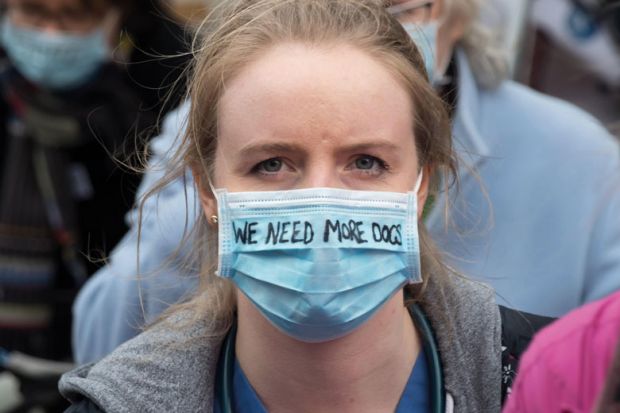Recruiting more medical students will not get “anywhere near” to solving the UK’s shortage of doctors unless it is accompanied by renewed efforts to retain existing trainees, the incoming chair of the Medical Schools Council has said.
Ministers have ruled out extending a temporary uplift in funding allowing schools to take on more medical students that was introduced during the pandemic, resulting in a squeeze in admissions this year.
Some, including the Russell Group, have warned that the decision has “limited opportunities” at a time when the NHS is in the midst of a recruitment crisis.
But Patrick Maxwell, who was announced as the new chair of the MSC in August, said that a completely different approach is needed to “really tackle the workforce problems”.
“Of course, increasing the number of places is likely to be a part of the solution but it is not going to get anywhere near to tackling the whole problem,” he said, adding that changing the numbers “is not simple”.
One issue would be in extending the number of high-quality clinical placements available, according to Professor Maxwell, who is also head of the University of Cambridge’s medical school.
“One limiting factor is the number of clinical placements that the NHS can provide. That will vary a bit in one part of the country to another but you can’t just dial up the number easily, especially when the NHS is facing so many challenges. What we must not do is compromise on the quality of education. It’s vital that doctors to have really good foundations to be life-long learners throughout their career.”
Instead, Professor Maxwell said there needed to be more of a focus by the NHS on addressing why so many qualified doctors are leaving the NHS to go to other jobs or other countries.
Professor Maxwell welcomed the broadening of institutions that are now offering medical training, after the opening of five new schools in more modern universities. He said this would help the profession be more representative of the country as a whole and the people it served.
Ensuring a wider range of people consider medicine as an option is one of the priorities for Professor Maxwell during his term, as well as pushing the benefits of investing in medical research and the role it can play in the UK’s aspirational “science superpower” status.
“I think medical schools are well placed to ensure the benefits of that research really reach the people who are most in need of improved health outcomes. I do think that is a massive opportunity…[and] as medical schools, we can articulate that more clearly.
“I’m passionate about it not because I think it would be good for medical schools but because I think it will be good for the country.”




